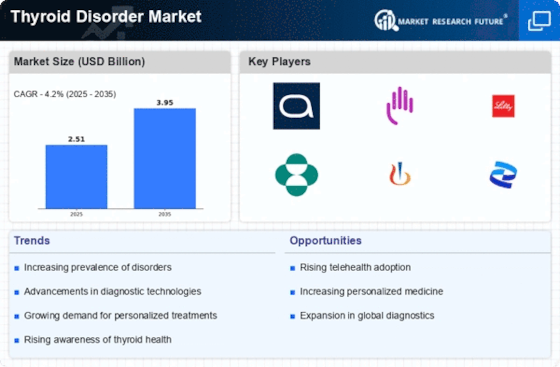Market Trends
Key Emerging Trends in the Thyroid Disorder Market
The thyroid disorder market is witnessing significant trends driven by various factors such as increasing prevalence of thyroid disorders, advancements in diagnostic technologies, and evolving treatment approaches. Thyroid disorders, including hypothyroidism, hyperthyroidism, and thyroid nodules, affect millions of individuals worldwide and require timely diagnosis and management to prevent complications. One notable trend in this market is the rising incidence of thyroid disorders, attributed to factors such as iodine deficiency, autoimmune diseases, genetic predisposition, and environmental factors. As awareness of thyroid health grows and diagnostic capabilities improve, more cases of thyroid disorders are being diagnosed and treated, driving market growth for thyroid disorder management products and services.
Technological advancements play a pivotal role in shaping market trends in the thyroid disorder market. Innovations in diagnostic imaging techniques such as ultrasound, computed tomography (CT), and magnetic resonance imaging (MRI) enable more accurate and detailed visualization of the thyroid gland and surrounding structures. Moreover, molecular diagnostic tests and biomarker assays facilitate the early detection of thyroid cancer and other thyroid-related conditions, improving patient outcomes and guiding treatment decisions. Additionally, telemedicine and remote monitoring technologies enable healthcare providers to remotely assess thyroid function, monitor medication adherence, and adjust treatment regimens as needed, enhancing patient convenience and access to care.
Furthermore, the COVID-19 pandemic has impacted market trends in the thyroid disorder market, influencing healthcare delivery, patient behavior, and treatment approaches. The pandemic has led to disruptions in routine medical care and delayed diagnosis and treatment of thyroid disorders due to resource constraints and safety concerns. However, telehealth services and virtual consultations have emerged as valuable tools for managing thyroid disorders remotely, enabling patients to consult with healthcare providers, refill prescriptions, and monitor their condition from the safety of their homes. Additionally, the pandemic has prompted greater emphasis on preventive healthcare and self-management strategies, driving demand for thyroid health monitoring devices and home-based testing kits.
Another significant trend in the thyroid disorder market is the increasing focus on personalized medicine and targeted therapies. Advances in genomic sequencing and molecular profiling enable healthcare providers to identify specific genetic mutations and molecular markers associated with thyroid cancer and other thyroid disorders. This knowledge allows for more precise diagnosis, prognosis, and treatment selection, optimizing therapeutic outcomes and minimizing side effects. Moreover, targeted therapies such as tyrosine kinase inhibitors and immunotherapy offer promising options for patients with advanced or refractory thyroid cancer, expanding the treatment armamentarium and improving survival rates.
Moreover, demographic shifts and changing lifestyle factors influence market trends in the thyroid disorder market. With aging populations and the increasing prevalence of obesity and autoimmune diseases, there is a growing burden of thyroid disorders worldwide. Additionally, environmental factors such as exposure to radiation, toxins, and pollutants contribute to thyroid dysfunction, further driving the demand for thyroid disorder management products and services. Furthermore, changing dietary patterns and lifestyle habits, including stress, lack of exercise, and poor nutrition, impact thyroid health and increase the risk of thyroid disorders, emphasizing the importance of preventive measures and early intervention.
Regulatory factors also play a significant role in shaping market trends in the thyroid disorder market. Regulatory agencies such as the FDA (Food and Drug Administration) and the European Medicines Agency (EMA) regulate the approval, manufacturing, and marketing of drugs, diagnostic tests, and medical devices used in the diagnosis and treatment of thyroid disorders. Compliance with regulatory standards and guidelines is essential for market entry and commercialization, ensuring product safety, efficacy, and quality. Additionally, reimbursement policies and insurance coverage for thyroid disorder management products and services vary across different regions and healthcare systems, influencing market access and pricing strategies for manufacturers and healthcare providers.



















Leave a Comment